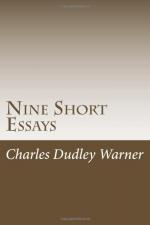One o’clock! The lights were going out in the Tuileries, had nearly all gone out. I wondered if the suspicious and timid and wasteful Emperor would keep the gas burning all night in his room. The night-roar of Paris still went on, sounding always to foreign ears like the beginning of a revolution. As I stood there, looking at the window that interested me most, the curtains were drawn, the window was opened, and a form appeared in a white robe. I had never seen the Emperor before in a night-gown, but I should have known him among a thousand. The Man of Destiny had on a white cotton night-cap, with a peaked top and no tassel. It was the most natural thing in the land; he was taking a last look over his restless Paris before he turned in. What if he should see me! I respected that last look and withdrew into the shadow. Tired and hungry, I sat down to reflect upon the pleasures of the gay capital.
One o’clock and a half! I had presence of mind enough to wind my watch; indeed, I was not likely to forget that, for time hung heavily on my hands. It was a gay capital. Would it never put out its lights, and cease its uproar, and leave me to my reflections? In less than an hour the country legions would invade the city, the market-wagons would rumble down the streets, the vegetable-man and the strawberry-woman, the fishmongers and the greens-venders would begin their melodious cries, and there would be no repose for a man even in a public garden. It is secluded enough, with the gates locked, and there is plenty of room to turn over and change position; but it is a wakeful situation at the best, a haunting sort of place, and I was not sure it was not haunted.
I had often wondered as I strolled about the place in the daytime or peered through the iron fence at dusk, if strange things did not go on here at night, with this crowd of effigies of persons historical and more or less mythological, in this garden peopled with the representatives of the dead, and no doubt by the shades of kings and queens and courtiers, ‘intrigantes’ and panders, priests and soldiers, who live once in this old pile—real shades, which are always invisible in the sunlight. They have local attachments, I suppose. Can science tell when they depart forever from the scenes of their objective intrusion into the affairs of this world, or how long they are permitted to revisit them? Is it true that in certain spiritual states, say of isolation or intense nervous alertness, we can see them as they can see each other? There was I—the I catalogued in the police description—present in that garden, yet so earnestly longing to be somewhere else that would it be wonderful if my ‘eidolon’ was somewhere else and could be seen?—though not by a policeman, for policemen have no spiritual vision.




